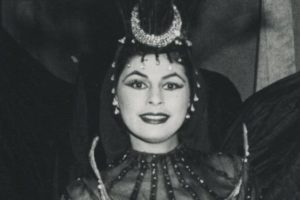

Massenet’s heroine Lucette is a more melancholy lass than Angelina, the Cinderella of La Cenerentola, Rossini’s dramma giocoso which premiered more than 80 years earlier. While Angelina’s scrappy determination, aided by Alidoro’s intervention, paves the way for her eventual marriage to the Prince, Lucette’s triumph arrives courtesy of the magic that Rossini’s opera eschews: La Fée, her supernatural coloratura godmother, arrives to transform the sleeping girl into a breathtaking vision in pink (with the obligatory sparkly glass slippers) for the Prince’s ball.
In Peter Kazares’s warm and wise production, rather than tending a hearth this Cendrillon busies herself cleaning up the café which is part of the home that she shares with her feckless father Pandolfe and his obstreperous second wife Mme. de la Haltière and her vapid bovine daughters Dorothée and Noémie. Bullock’s exquisite opening monologue instantly manifested the girl’s sad resignation to work and work and not to dream of love and happiness. Throughout the long part, this immensely sympathetic artist displayed a glowing, wide-ranging soprano that descended from a secure top spiced with a quick vibrato to a mellow, smoky middle to a surprisingly full lower register.
If Lucette is a more passive participant in her own fate than Angelina, Bullock still projected a moving strength of character as Lucette hesitantly bantered with the heretofore morose Prince at the ball culminating in her tender ariette “Vous êtes mon Prince Charmant!” Yet when she has to flee the ball at the appointed midnight, this Cinderella lapsed into an implacable sadness that even her father’s tender pleadings could not dissuade. Here Bullock beautifully delineated Lucette’s shifting moods from quiet ecstasy to suicidal despair.
When she fled the café to do away with herself, Kazares has her end up in a cinema where she encounters the equally bereft Prince. Most of the other directorial choices for this quietly effective production set in postwar France seemed apt; however, the cinema fell flat proving a puzzling, less evocative alternative to the usual mysterious forest. Yet this directorial lapse could not mar this glorious scene (overseen by the ever-watchful La Fée) which features one of the most rapturous love duets in all French opera.
Massenet composed the Prince as a trouser role for mezzo soprano, something he repeated a few years later with the protagonist of Chérubin. If Juilliard’s prince, Lacey Jo Benter, failed to match the crystalline sublimity of her paramour, she partnered Bullock effectively in that great duet revealing a wild and rangy mezzo that could profit from being used with more finesse and subtlety.
Elizabeth Sutphen’s light soprano La Fée floated exquisitely over the action with blissful high notes and airy trills. She was wittily costumed as an efficient secretary with glasses and a sensible blue suit and helped by six sparky spirits clad in red movie-usherette uniforms. Throughout, those Gabriel Barry costumes (apparently all brooding Massenet heroes this season wear floor-length overcoats) and Donald Eastman’s simple and effective sets were beautifully lit by the always marvelous James F. Ingalls.
As Mme. de la Haltière, Avery Amereau brandished an effectively booming contralto but she must be careful to not force her young instrument; as her obedient daughters Marguerite Jones and Lilla Heinrich Szász pounced gamely onto their small roles while gleefully scarfing down some delectable-looking French pastries.
After Bullock, the evening’s most accomplished performer was Szymon Komasa, recent winner of the Marcella Sembrich Vocal Competition, as a warmly winning Pandolfe. His burnished baritone beautifully partnered Bullock in the exquisitely moving duet in which the anguished father promises his devastated daughter to flee the unforgiving city and return to their earlier, simpler life on the farm.

But, happily, Villaume and Kazares retained Massenet’s mezzo Prince unlike the otherwise fine Frederica von Stade recording and the 2007 New York City Opera production both of which inexplicably substituted a tenor thereby ruining the love duets.
Along with being enraptured by the radiant Julia (who was equally marvelous last year in the title role of Juilliard Opera’s production of Jána?ek’s The Cunning Little Vixen), I suspect that—like my friend and I—most of the audience left the theater wondering why this sweet and touching opera isn’t done more often. I have loved it almost more than any other Massenet opera since I saw the underrated Faith Esham in the title role of New York City Opera’s previous production nearly 30 years ago.
But two performances remain of Juilliard’s delectable contribution to Lincoln Center’s “Cinderella-fest,” as do two (with Joyce and Javier, that is) of the Met’s just across the street.
Photos: Nan Melville























Comments